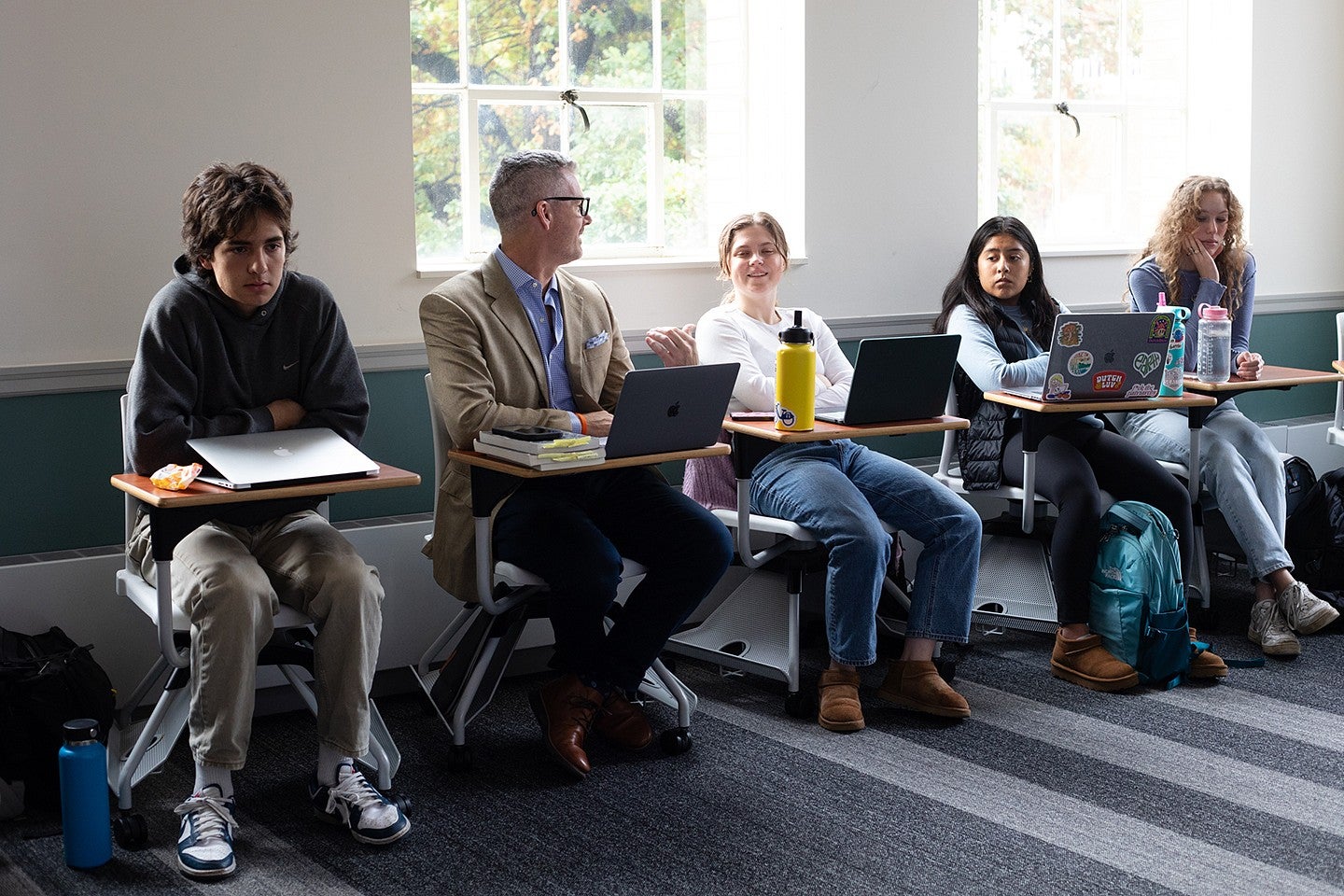
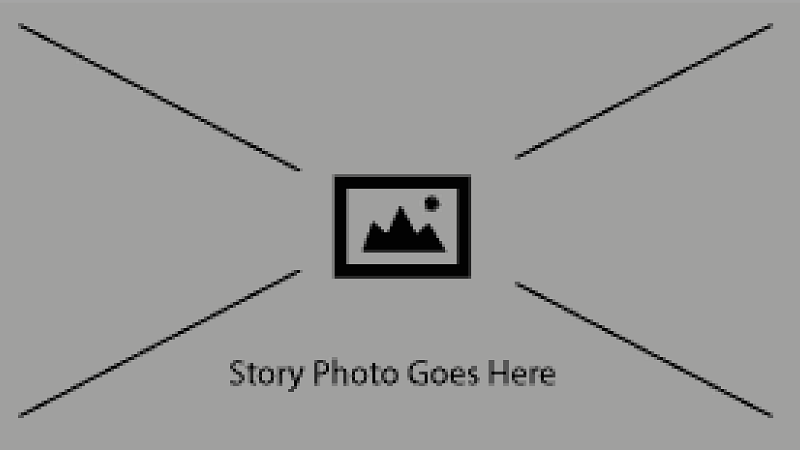
Interviews, Intimacy, and Underwater Ecosystems
Every day, students get up, pack their backpacks with textbooks and notepads and head out to classes. It’s a routine that gets repeated across the university.
At the Clark Honors College, core faculty do their best to teach in a way that makes the classroom a dynamic place to learn. Faculty curate courses around specialized topics and encourage students to think outside the boundaries of the classroom.
In winter term 2024, the Honors College will introduce five new classes that offer innovative ways of learning to help solve complex issues. “There is such an incredible range of options this winter, from courses about comedy and disability to environmental change,” says Acting Dean Carol Stabile. “The courses are so relevant, too, to what’s going on in the world.”
In these classes, honors college students will have the chance to engage with materials that will challenge their perspectives, leave them hungry for more and help build a better understanding of themselves in and out of the classroom.
“This year is the first year that more than 80 percent of our courses are taught by core faculty,” Stabile notes. “These faculty members who support Honors College students Throughout their time at the UO. Students get to form long lasting relationships with these professors.”
Coral Reef Acoustic Ecology
Lisa Munger, CHC Core Faculty Member in Marine Biology
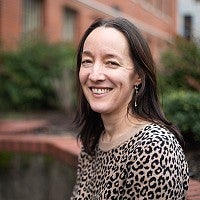
Earlier this year, Lisa Munger was diving in the turquoise waters of the Misool Marine Reserve in Indonesia. While swimming among the fish, manta rays, and pristine pillars of the coral, Munger placed a hydrophone - an underwater acoustic monitor that records underwater sounds - at the end of one of the piers.
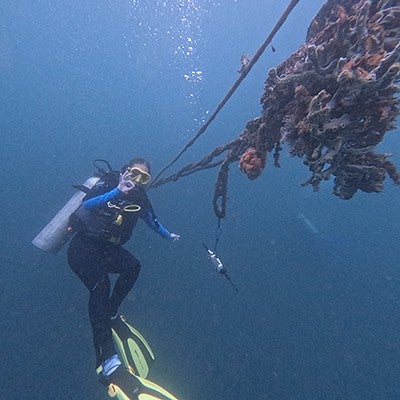
This winter, Munger will retrieve the instrument and use its findings as the basis for her new course, “Coral Reef Acoustic Ecology.”
Patrol boats in the reserve monitor fishing, diving, and other banned practices, which results in a biodiverse coral reef ecosystem. Munger’s students will use her findings to conduct a research project about the health of the reef. “Lots of things make noises. There’s snapping shrimp, fish, marine mammals, divers, boat traffic,” Munger explains. “It’s a way to monitor underwater activity and the health of an ecosystem.”
Munger formed relationships with some of her fellow scientists and academics while conducting her research. She plans to write a proposal to develop a co-taught course at the Honors College and Universitas Pattimura in Ambon, Indonesia. “My vision is that it’ll be kind of this international collaboration, with Honors College students and Indonesian students, and then sharing results with the Misool Marine Reserve,” she says.
“The goal is to have people working on something real, something timely, and to have the results go beyond the classroom,” Munger says.
Interviews Inside and Out; “Are you Happy?”
Christopher Michlig, Professor of Art
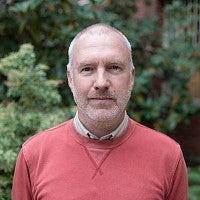
Professor Christopher Michlig has always loved the art of the interview, citing reading interview transcripts as his favorite way to get to know a person or a topic. In 2015, Michlig and his partner, Wendy Heldmann, launched “Five Minutes,” an interview-based publication in the UO’s School of Art + Design with the College of Design. The purpose of the publication is to reverse the power dynamic between graduate students and visiting artists so students can take power into their own hands when conducting interviews.
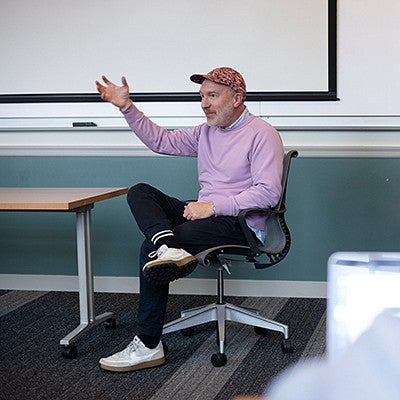
“Importantly, it was never a curricular initiative. It was always extracurricular,” Michlig says. “There was some early interest in that publication becoming a class, but because there’s so much on people’s plates as grad students, I wanted it to be an opportunity rather than an obligation.”
In his new post in the Honors College, Michlig has been able to expand his love of interviews into an academic course, “Interviews Inside and Out; “Are You Happy?”
The course will combine reading, writing, and literary analysis, and explore a different function or history of the interview each week. The final project is an interview led by each student. Michlig is excited to look at Marcel Proust’s “Parlor Questionnaire,” a famous set of questions that is the basis for many modern interviews, “The Image of the City” by Kevin J. Lynch, an interview-based city planning work, and Andy Warhol’s interviews in Interview Magazine with his class.
“Having tools and some experience learning about interviews can lead to enhanced confidence and ability to engage with others,” Michlig says. He hopes that students will leave his course with a newfound ability to ask meaningful questions and employ interviewing skills in the real world.
Body Politic and the Art of Perception
Anita Chari, Associate Professor of Political Science, and Kate Mondloch, Professor of Contemporary Art and Theory
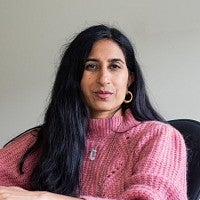

Anita Chari and Kate Mondloch grew up leading separate but similar lives. Both went to Georgetown University and both studied politics and political theory as undergraduate students. Chari stuck with political science; Mondloch switched to art history.
Before they started working together at the Honors College, students would come up to Mondloch and say that she needed to talk to Chari because they would get along. “We have this weird merger of the minds,” Mondloch says. “That’s why I’m really excited about this class.”
Mondloch and Chari will be co-teaching “Body Politic and the Art of Perception,” a class about the importance of the body in the way humans experience the world. “Our physical experiences are really important in terms of cognition, emotion regulation, overall wellbeing, and recognizing our internal social and racial biases,” Mondloch says.

In the class, students will be able to recognize the importance of their physical being in daily life through analyzing content - podcasts, readings, and analysis - and through perception labs. “We literally do not see the world as it is. We only see the world as we see it, and we’re influencing everything about our own experiences, but we just don’t know it,” Mondloch says.
The perception labs will allow students to test their bodily biases and perceptions in real life, synthesizing what students are learning in class. For one of the perception labs, students will attend the Strange Weather art exhibit at the Jordan Schnitzer Museum of Art, which features themes of race and bodies through contemporary art. Students will look for different themes, keeping what they’ve been learning in class in mind while they experience the art.
“The goal is to not just talk about perception but take it out for a road test,” Mondloch says.
Human Care and Intimacy
Tobin Hansen, CHC Core Faculty Member in Anthropology
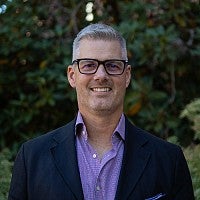
Tobin Hansen will be teaching a course on human intimacy, focusing on the close, everyday ways our lives become entwined. He says that material, emotional, and symbolic dimensions of human relationships will be explored. Material entanglements, he says, are shared “living spaces, clothes, things we borrow and lend because we need them.” Emotional entanglements are the feelings we have and share. And symbolic entanglements are how we ascribe status and to certain types of relationships.
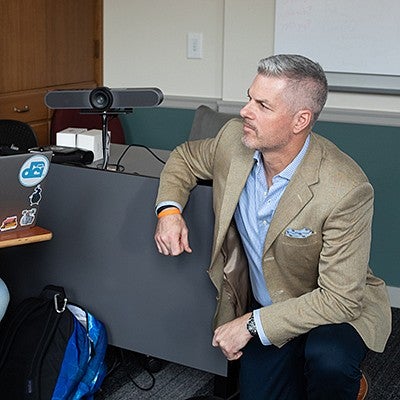
“We’ll have a chance to talk about our own experiences and lives, and who we are as people,” Hansen says. The class will touch on what it means to live with other people, and the intricacies of being a friend, romantic partner, or having other interpersonal relationships. “Human Care and Intimacy” will be based on reading and discussion of theory. Hansen is excited to look at the text "After War" in class, and possibly “Paris is Burning.”
“For marginalized people, the way that they find their people is important,” he says. “Gang communities, queer communities, prison communities—there are all sorts of ways we make relationships with other people that we will study in the class,” he says.
Hansen wants students to walk away from the course with a new understanding of the meaning of human relationships. “I want students to understand the way we shape our relationship ties and the way they shape our experience,” he says. “It’s important to think critically about things we do every day and what it means for our positioning in the world.”
Verifying the Viral: Investigating Science on Social Media
Lindsay Hinkle, CHC Core Faculty Member in Chemistry
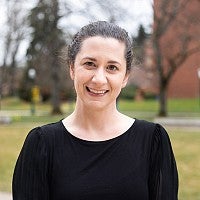
Throughout most of her career, Lindsay Hinkle has taught traditional general chemistry. But she has switched things up during her time at the Honors College. In the last few years, Hinkle has shifted her courses to incorporate the fundamentals of science into the daily lives of her students.
“I think it's really important as educators that we are trying new things and evolving the way that we're teaching,” Hinkle says. “For me, going in the lab and figuring out how to solve a problem is what I've been trained to do, but I also think that we can apply those same kinds of techniques to how we teach.”
With innovation in mind, Hinkle will be teaching a new course called “Verifying the Viral: Investigating Science on Social Media.” Students will learn how to evaluate information by dissecting scientific claims that have gone viral on social media. They will be determining whether these claims can be verified or disproven. With about 60 percent of the population on social media, it has become a portal that many rely on for information. Hinkle aims to teach students how to think for themselves using scientific procedures.
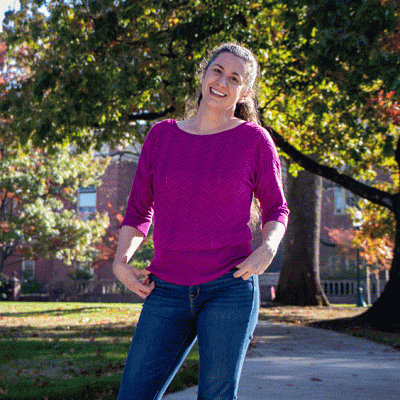
“I want my students to be more aware of what we're all consuming on social media and the importance of reminding ourselves that sometimes we need to take a second and think about what the information we see is trying to convey in a particular space,” she says.
Hinkle’s teaching philosophy centers around helping her students feel like they belong and that they’re capable even when things don’t go right the first time, she says. So, it’s no surprise that her new class on social media will put students in the driver’s seat. Students will have the freedom to choose case studies, design assignments, set specific goals for a long-term project and fulfill their own curiosities under the objectives of this course. This way, Hinkle’s course will be practicing scientific communication in a way that feels natural to students.
She’s mindful of the fact that students may have to get out of their comfort zones and be open to making mistakes or thinking outside of the box. This is when building a community in the classroom becomes vital. All in all, students can expect a learning environment fueled by creativity, collaboration and curiosity.
“We're going to be thinking deeply about these problems but also supporting one another in this process,” Hinkle says. “Everybody knows something different. So, when we start looking into scientific topics, students will gravitate toward different aspects. We're going to explore and see how everybody can bring their skill set to this table.”
